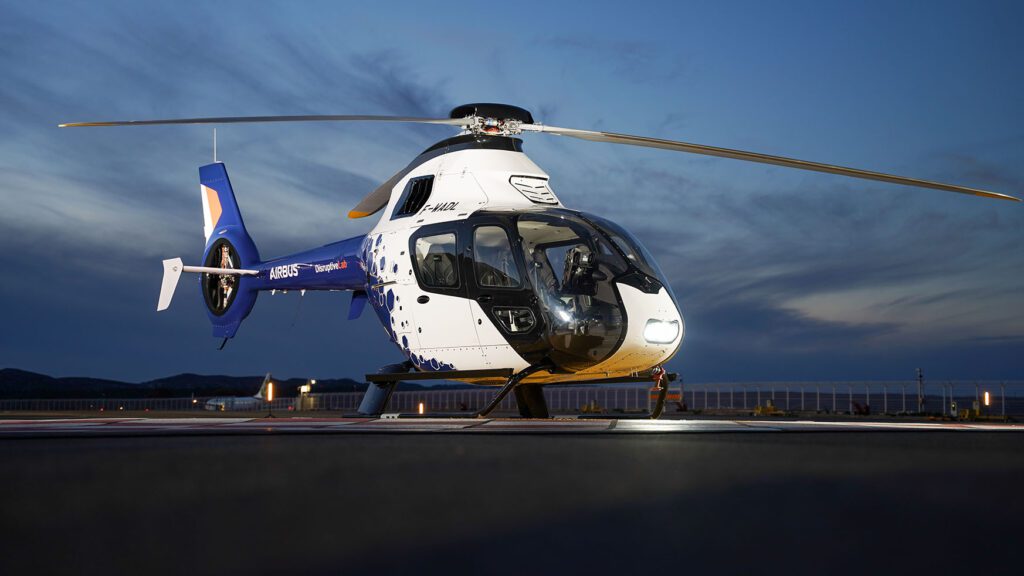
Airbus revealed its new flying laboratory, DisruptiveLab, to test technologies for improving aircraft performance and reducing CO2 emissions for helicopters. (Photo: Airbus)
During its annual summit this week, Airbus revealed its new flying laboratory called DisruptiveLab which was created to test technologies for improving aircraft performance and reducing CO2 emissions for helicopters. Airbus Helicopters plans to conduct the first flight of the DisruptiveLab before the end of 2022.
The French Civil Aviation Authority (DGAC) provided some financial support for the development of the DisruptiveLab demonstrator, which is part of the French Council for Civil Aviation Research Conseil’s roadmap.
Airbus previously developed another demonstration aircraft, the FlightLab, beginning in 2020. This concept used an H130 platform and targeted research and development of technology to enhance safety and autonomous operation. In comparison, the new DisruptiveLab is aimed at reducing the environmental footprint of aircraft and improving overall performance.
Bruno Even, CEO of Airbus Helicopters, commented during the Airbus Summit 2022 that the new demonstrator is at the core of the company’s roadmap towards clean aviation. The DisruptiveLab “will combine several technology bricks with the objective to reach a reduction of 50% CO2,” Even stated.
The team at Airbus Helicopters will be testing various components such as aerodynamics, weight, and hybrid power. “The innovative architecture and the fully parallel hybrid propulsion system could only really be tested on a brand new demonstrator in order to verify the combined impact in CO2 reduction,” he commented in the announcement by Airbus.
The company made several announcements during the summit. Airbus shared that it is developing a hydrogen-powered zero-emission engine that could be integrated into its aircraft entering service by 2035. The team plans to start flight testing the new hydrogen-powered fuel cell engine onboard the ZEROe demonstrator aircraft around 2025.

“Airbus has revealed that it is developing a hydrogen-powered fuel cell engine. The propulsion system is being considered as one of the potential solutions to equip its zero-emission aircraft that will enter service by 2035.” (Photo: Airbus)
“By continuing to invest in this technology we are giving ourselves additional options that will inform our decisions on the architecture of our future ZEROe aircraft, the development of which we intend to launch in the 2027-2028 timeframe,” remarked Glenn Llewellyn, VP Zero-Emission Aircraft at Airbus.
The ZEROe aircraft concepts are all fueled by hydrogen. While three of the aircraft have engines that utilize hydrogen combustion to drive gas turbines, the fourth is configured with six eight-bladed propellers attached to engine pods. The pods contain hydrogen fuel cells to produce electricity that will power electric motors.
This flight test demonstrator is the first developed by Airbus to have a megawatt-class hydrogen fuel cell engine. The demonstrator will use the A380 MSN001 multi-modal flight test platform. Airbus will install a customized cryogenic tank inside the aircraft’s rear fuselage that will hold the liquefied hydrogen.
“With the A380 we also have an aircraft that’s already fully instrumented,” explained Mathias Andriamisaina, Head of ZEROe Demonstrators and Tests at Airbus. He is quoted in the press release from Airbus, saying, “The flight-test-instrumentation (FTI) is a big part of the project and can be a big driver in terms of cost and planning. So MSN001 was the perfect fit for us.”
Airbus announced a collaborative effort with ArianeGroup this week. They will work together to build a liquid hydrogen refueling facility at the Toulouse–Blagnac Airport in France that is expected to start operating in 2025.

“Airbus and ArianeGroup, a joint venture equally owned by Airbus and Safran, and a world leader in space propulsion technologies, will work together to build the first liquid hydrogen refuelling facility for ZEROe aircraft at Toulouse, Blagnac airport.” (Photo: Airbus)
“ArianeGroup, with its unique skills and know-how in the storage, testing, and use of liquid hydrogen, enables new industrial sectors in Europe to accelerate their energy transition,” noted André-Hubert Roussel, CEO.